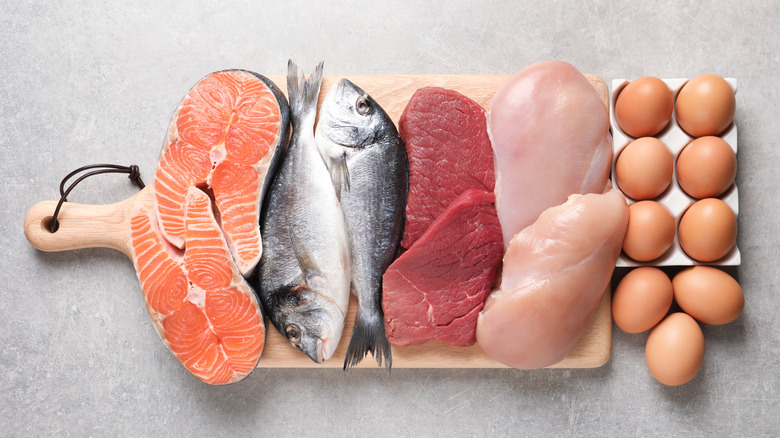Too Much Of This May Harm Your Kidneys
More than 37 million Americans live with chronic kidney disease, reports the National Kidney Foundation. What's even more shocking is that 90% of sufferers are not aware of their condition. On top of that, one-third of the population is at risk of developing this illness. Millions of others have kidney stones, cysts, or infections. Keck Medicine of USC says that kidney stones will affect about 12% of people at some point in their lives.
Some of these problems may have severe complications and affect vital organs. Polycystic kidney disease, for instance, can cause damage to your brain, heart, liver, kidneys, and pancreas, warns the American Kidney Fund. It also puts you at risk for high blood pressure, urinary tract infections, and bowel diseases. While it's not always possible to prevent these issues, there are steps you can take to keep your kidneys healthy.
Perhaps not surprisingly, even the best whole foods can affect kidney health when consumed in excess. In addition, the American Kidney Fund recommends cutting back on salt, fat, alcohol, and sugar, but you should also track your nutrient intake. Certain vitamins, minerals, and macronutrients may harm your kidneys, especially if you're prone to renal disease. There is one type of food, in particular, that may harm your kidneys if consumed too much.
The surprising link between protein and kidney health
Whether you're an athlete, weekend warrior, or someone trying to lose weight, you might have been told to eat more protein. This nutrient helps build and preserve lean mass, increases metabolism, and promotes satiety, according to 2012 research published in the British Journal of Nutrition. In the long run, it can improve body composition, or fat-to-muscle ratio, and prevent cardiometabolic disorders.
As the scientists note, a daily protein intake of 0.8 to 1.2 grams per kilogram of body weight is safe for healthy people with no kidney problems. Bodybuilders, powerlifters, and other athletes may consume up to 4 grams of protein per kilogram of body weight per day (via NASM). But as with most things, more isn't always better.
A 2016 research paper published in Food and Function warns that protein intakes higher than 2 grams per kilogram of body weight per day may harm the kidneys. What's more, eating large amounts of animal protein can result in kidney stones, notes Harvard Medical School. When consumed in excess, this nutrient affects citrate levels in the urine, which may promote stone formation. At the same time, it increases the excretion of oxalic acid, a molecule that contributes to kidney stones, according to a 2002 review featured in the BMJ.
Is it safe to eat a high-protein diet?
The research on protein and its impact on kidney health is conflicting. While most experts agree that too much protein can affect renal function, some say that only individuals with pre-existing kidney disease should be concerned. For example, a 2005 review published in Nutrition and Metabolism found no association between high-protein diets and kidney problems in healthy people. Researchers also say that it's unclear whether or not animal protein increases the risk of kidney stones.
High-protein diets may alter renal function in people with kidney disease, but not in healthy individuals, explains the above review. "Eating a lot of protein, especially animal protein and red meat, creates more acid and toxins in the body," nephrologist Juan Calle told the Cleveland Clinic. As a result, your kidneys need to work harder to break down those compounds. His advice is to consult a healthcare provider before increasing your protein intake, especially if you have a history of kidney stones or renal disease.
Stay on the safe side and do some tests to rule out any kidney problems prior to adding more protein to your diet. Most importantly, vary your protein sources and eat a balanced diet. Pork, beef, eggs, and other foods rich in animal protein are particularly tricky, but you can also get this nutrient from nuts, seeds, vegetables, and legumes. For example, edamame boasts a whopping 18 grams of protein per cup, while tofu provides up to 16 grams per 3 ounces (via Cleveland Clinic).



